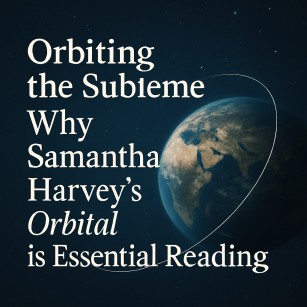Samantha Harvey's 2024 Booker Prize Review
BOOKS REVIEW
Chaifry
5/31/20253 min read
Orbital
Samantha Harvey’s Orbital, the 2024 Booker Prize winner, is a groundbreaking work, distinguished as the first space-set novel to secure this prestigious accolade. Set aboard the International Space Station (ISS), this slim 136-page novel captures a single day in the lives of six astronauts, offering a profound meditation on Earth’s beauty and fragility. Harvey, a British author previously longlisted for the Booker in 2009 for The Wilderness, blends lyrical prose with philosophical inquiry, transcending traditional science fiction. This review argues that Orbital is essential reading for its exquisite language, innovative perspective, and urgent environmental and existential reflections, compelling us all to reconsider our relationship with our planet.


Orbital unfolds over 24 hours, during which six astronauts—from the United States, Russia, Italy, Britain, and Japan—witness 16 sunrises and sunsets while orbiting Earth at 17,000 miles per hour. The novel eschews conventional plot, instead presenting a mosaic of observations, memories, and musings. The astronauts marvel at Earth’s landscapes—glaciers, deserts, oceans—while confronting personal grief, such as a mother’s death, and global crises, like a typhoon threatening the Philippines. The ISS, described as “old and creaky” with “a crack has appeared” (Harvey, 2023, p. 98), mirrors humanity’s fragile ambitions. Key themes include environmental vulnerability, human isolation, and interconnectedness, with the narrative’s rhythm tied to the orbital cycle.
Five key quotes illuminate the novel’s essence:
“Raw space is a panther, feral and primal” (Harvey, 2023, p. 45), capturing the wildness of the cosmos.
“What we do to the Earth we do to ourselves” (Harvey, 2023, p. 134), underscoring environmental reciprocity.
“They dream the same dreams—of fractals and blue spheres and familiar faces engulfed in dark” (Harvey, 2023, p. 67), blending cosmic and personal realms.
“You have to do the dusting and the vacuuming and fix the toilet” (Harvey, 2023, p. 112), grounding the sublime in the mundane.
“This lonely planet… a fraction of a second of its billions-of-years-old history” (Harvey, 2023, p. 89), evoking humanity’s fleeting presence.
These elements frame Orbital as a “space pastoral” (Harvey, 2023, p. 120), reimagining Earth from a cosmic vantage point.
Orbital’s brilliance lies in its poetic prose and philosophical depth, making it a vital call to reflect on humanity’s place in the cosmos. Harvey’s language is luminous, as seen in her description of Earth as “a lonely planet” (Harvey, 2023, p. 89), which evokes awe and existential melancholy. The Booker judges praised its “extraordinary intensity of attention to the precious and precarious world we share” (The Booker Prizes, 2024), and Harvey’s seamless integration of environmental concerns—such as the typhoon’s “floodwaters surge inland” (Harvey, 2023, p. 115)—avoids didacticism while urging action. Her allusions to Velázquez’s Las Meninas and Foucault’s The Order of Things (“So what is the real subject of the painting… is it just a painting about nothing?”; Harvey, 2023, p. 102) enrich the text, inviting readers to question existence itself.
However, the novel’s lack of a traditional plot may challenge readers seeking narrative momentum. Critic James Wood describes it as “barely a novel” due to its minimal plotting (Wood, 2024). The astronauts’ stories, such as Chie’s grief or Shaun’s childhood memories, feel fragmented, with limited interaction, rendering characters somewhat distant. For example, the humorous note of “ongoing political disputes” over national toilets (Harvey, 2023, p. 76) lacks deeper exploration of crew dynamics. Some BookTok reviews critique it as “style over substance” (ArtsHub, 2024), suggesting its meditations can seem superficial. A Dwutygodnik review also notes references to disputed territories like the Kuril Islands may unintentionally echo geopolitical tensions (Mykytenko, 2024), potentially alienating readers. Yet, Orbital’s brevity and innovative perspective—viewing Earth as both majestic and vulnerable—make it a powerful, accessible work that resonates universally.
Orbital is a luminous, essential novel that redefines literary fiction through its cosmic lens and poetic urgency. Samantha Harvey’s exquisite prose and innovative setting aboard the ISS craft a profound meditation on Earth’s fragility and humanity’s interconnectedness, making it a must-read for all. While its lack of plot and fragmented character arcs may not suit everyone, its environmental and existential insights outweigh these flaws. Recommended for readers seeking introspective, lyrical fiction that challenges conventions and inspires reflection, Orbital is a radiant call to cherish our planet.
References: Harvey, S. (2023). Orbital. Grove Atlantic.
